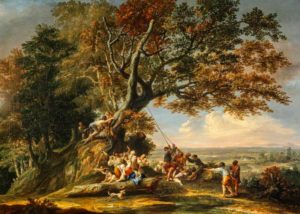One of the good gifts that God has given to human beings is that of memory and the facility to remember the past. Remembering our own personal past is absolutely vital to knowing who we are and having a sense of personal identity. We all know how diseases that ravage a person’s memory destroy the ability of that person to function in any meaningful way in the present.
The same holds true for communities and nations. When a community or nation forgets its past and where it has come from, it will be completely disoriented and ultimately unable to move ahead into the future. Of course, like any good gift in our fallen world, this gift of remembering can be abused. It can bind a person, and even a community, to the past in hopeless regret or unforgiving bitterness or even vengeful hatred.
But if it is true that knowledge of the past is vital to meaningful living in the present and the future, and I believe it is, then Evangelicals in the West face a very uncertain future for we are living in a day when knowledge of our past as Evangelical Christians is abysmally low. Who were our forebears and what did they believe? What was their experience of God and how did that shape the churches they founded, churches which we have inherited?
This Evangelical forgetfulness of the past is thus actually a species of worldliness.
Far too many Western Evangelicals neither know nor do they care. As Adaline Bowman, the heroine of the romantic fantasy movie The Age of Adaline (2015), confessed, “I don’t think I will ever understand why so few people care about history.”
In this regard, Evangelicals are actually indistinguishable from Western culture, which is passionately in love with the present, eagerly anticipating the future, and essentially disinterested in the past, or if nodding interest is shown in days gone by, it is used as a vehicle for escapist entertainment. This Evangelical forgetfulness of the past is thus actually a species of worldliness.
The vital importance of remembering
The Scriptures, on the other hand, make much of remembering:
- Deuteronomy 24:9: “Remember what the LORD your God did to Miriam on the way as you came out of Egypt.”
- 1 Chronicles 16:12/Psalm 105:5: “Remember the wondrous works that he [that is, the Lord] has done, his miracles and the judgments he uttered.
- Luke 17:32: “Remember Lot’s wife.”
- Hebrews 13:7: “Remember your leaders, those who spoke to you the word of God. Consider the outcome of their way of life, and imitate their faith.”
Important questions
So, in this year of our Lord 2021, just over 500 years after Martin Luther initiated what we call the Reformation by nailing the 95 Theses to the church door in Wittenberg in Germany on All Hallows eve (October 31), we take a moment to remember that movement of revival and reform.
We do so because the events of the Reformation have given rise to the host of Evangelical churches that exist today. If the events of those revolutionary years had not happened things would be quite different today. We remember that era not only to gain a better idea of where we have come from, but also because people from that day can give us wisdom and guidance in the present.
Speaking concisely, the Reformation was necessary because people during the Middle Ages forgot the answers to four very important questions:
- What saves a person from judgment and hell?
- Who saves us from judgment and hell?
- How do we know the answers to these two questions?
- Then, given these answers, how should we worship?
The Reformation was not only a recovery of such basic truths of the Gospel and how we need to respond to God in light of them, but it also led to the recovery of biblical perspectives in a host of other areas, for example, marriage and family as well as state and church relations.
Revival at Heidelberg
The Reformation was also a time of revival as well. Some today wrongly distinguish revival from reform. But they are two sides of a coin. One cannot have the presence of the Holy Spirit reforming the church without his in-breathing of new life into men and women and institutions. Nor can one have the Spirit reviving God’s people without reminding them of truths forgotten or ignored.
He is not righteous who does much, but he who, without work, believes much in Christ — Martin Luther
This can be clearly seen in an event that took place in April of 1518, a few months after Martin Luther had published his 95 Theses. Luther had been commanded to give an account of his views to various papal representatives at Heidelberg in the Palatinate, some 350 miles from Wittenberg. He was joined by a few hundred monks of his monastic order, the Augustinians.
Luther argued his case in 28 theses, of which the climax was thesis 25: “He is not righteous who does much, but he who, without work, believes much in Christ,” a classic statement of the heart of Reformation doctrine. But things did not turn out in the way the papal representatives hoped. Instead of Luther being silenced by the papal representatives, almost the entire German contingent of Luther’s monastic order, the Augustinians, were won over to his views!
As Jeremy Jackson rightly noted in his history of the church, there would have been no Reformation unless it had been accompanied by the Spirit’s reviving work of regeneration and conversion. The impact of Luther’s preaching at the Heidelberg Disputation is a tremendous illustration of this truth.
























